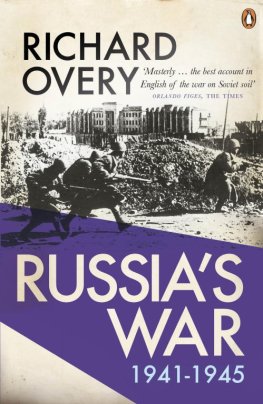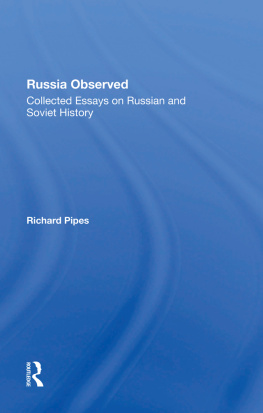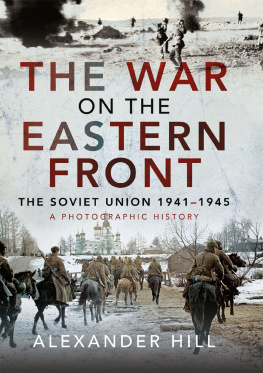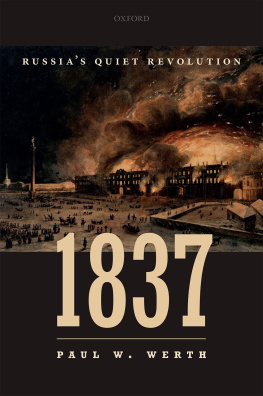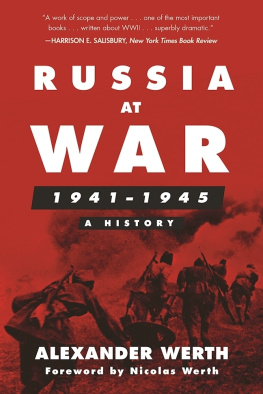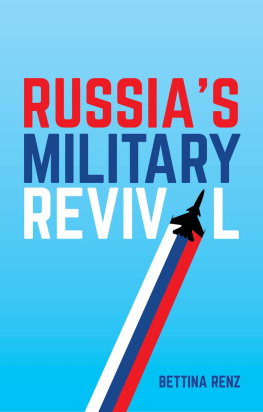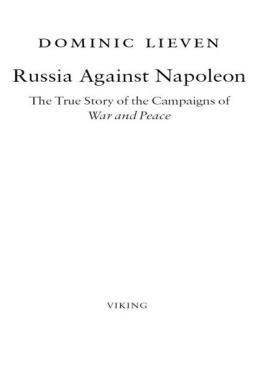PRAISE FOR RUSSIA AT WAR 19411945
Magnificent. It fills a great void. the best book we probably shall ever have in English on Russia at war.
William Shirer, author of The Rise and Fall of the Third Reich
This is not merely a history (although it happens to be an excellent one). It is not a collection of personal reminiscences (although it incorporates many). It is not a scholarly examination of Russia during the critical years 19411945 (although it puts under close analysis many events during that period). [Werths] Russian panorama has the depth and vividness of a Vereshchagin warscape. His descriptions of Nazi atrocities are almost too terrible to read. [Russia at War] overflows with the contradictory, the half-understood, the mysterious, the impossible to explain. It bears comparison with William L. Shirers The Rise and Fall of the Third Reich as a work of scope and power. One of the most important books yet written about WWII superbly dramatic.
Harrison E. Salisbury, The New York Times Book Review
There is no book in any language with which to compare this monumental but exceedingly readable history of the Nazi-Soviet war in savagery and hatred it was the biggest war in history an engrossing and terrifying book.
Life
Engrossing history spellbinding narrative.
Newsweek
Monumental and absorbing. An epic work that will fascinate the ordinary reader.
Saturday Review
An illuminating book.
Elbridge Colby
Alexander Werth was one of the greatest war correspondents of the Second World War.
Antony Beevor
ALSO BY ALEXANDER WERTH:
France in Ferment (1934)
The Destiny of France (1937)
France and Munich: Before and After the Surrender (1939)
The Last Days of Paris (1940)
The Twilight of France (1942)
Moscow 41 (1942)
Leningrad (1944)
The Year of Stalingrad (1946)
Musical Uproar in Moscow (1949)
France 19401955 (1956)
The Strange History of Pierre Mends-France (1957)
America in Doubt (1959)
The de Gaulle Revolution (1960)
The Khrushchev Phase (1961)

Copyright 1964 by Alexander Werth
Foreword copyright 2011 by Nicolas Werth
English translation of foreword 2017 by Skyhorse Publishing
All rights reserved. No part of this book may be reproduced in any manner without the express written consent of the publisher, except in the case of brief excerpts in critical reviews or articles. All inquiries should be addressed to Skyhorse Publishing, 307 West 36th Street, 11th Floor, New York, NY 10018.
Skyhorse Publishing books may be purchased in bulk at special discounts for sales promotion, corporate gifts, fund-raising, or educational purposes. Special editions can also be created to specifications. For details, contact the Special Sales Department, Skyhorse Publishing, 307 West 36th Street, 11th Floor, New York, NY 10018 or info@skyhorsepublishing.com.
Skyhorse and Skyhorse Publishing are registered trademarks of Skyhorse Publishing, Inc., a Delaware corporation.
Visit our website at www.skyhorsepublishing.com.
10 9 8 7 6 5 4 3 2 1
Library of Congress Cataloging-in-Publication Data is available on file.
Cover design by Rain Saukas
Print ISBN: 978-1-5107-1625-4
Ebook ISBN: 978-1-5107-1627-8
Printed in Canada
To the Memory of
MITYA KHLUDOV
aged 19
Killed in Action
in Belorussia
July 1944
CONTENTS
.
MAPS
FOREWORD by Nicolas Werth Translated by Grace McQuillan
It may be many years before I am able to bring to a close a more significant work on Russia at war, wrote Alexander Werth in the 1944 preface to his war diary, Leningrad 1943.Russia at War would not be published until 1964, nearly twenty years after the end of the Second World War. It would have taken twenty years for the British war correspondent on the Eastern Front to achieve the necessary distance, to undertake the patient work of a historian, and to compare his own experiences with the stories told by the conflicts major players and the historical research on the war in the East that had been conducted in the meantimeparticularly in the early 1960s and beyondas much in the USSR as in the West.
Upon its release, Russia at War established itself as a classic, the best book we probably shall ever have in English on Russia at war (William Shirer). It was very quickly translated into a dozen languages. In 1965, it was released in the USSR (admittedly at the price of several minimal deletions, grudgingly accepted by Werth) where, twenty-four hours after its appearance in stores, the 25,000 available copies sold out.
More than fifty years later, the republication of Russia at War seems relevant to me for at least two reasons: to this day, no other work has analyzed in its entirety the way in which the Soviet regime and society were profoundly marked, shaped, and transformed by the experience of the war. In addition, many of the questions Werth poses, as well as the theories he offers and his general observations over the course of numerous interviews, prove to be extraordinarily useful in the advancement of historical research on Russia at war.
A recognized journalist, and one who spoke perfect Russian, Alexander Werth immediately appeared as the ideal candidate for the task of covering the war in the East after the German invasion of the USSR on June 22, 1941. On the first of July, he took his place on the plane bringing members of the British Military Mission to Moscow, led by General MacFarlane, as a correspondent for the BBC and The Sunday Times. Werth would remain in the USSR until May 1948. During the war, every Sunday evening at nine, he hosted a widely followed program on the airwaves of the BBC called Russian Commentary, the only program dedicated entirely to the war in the East. In addition to this weekly broadcast, Werth kept a journal of the war, long excerpts of which are published in the form of books: Moscow 41, Leningrad, and The Year of Stalingrad. In April and May 1945, he joined the Battle of Berlin and obtained a noteworthy interview with Marshal Zhukov.
After the end of the war, Werth decided to continue his work as a journalist in Moscow, still for The Sunday Times, but also for The Manchester Guardian. In September 1946, all the international press agencies published Joseph Stalins Answers to the Questions of British Correspondent Alexander Werth, in which Stalin laid out, by way of an interview in writing granted to the most famous foreign journalist posted in Moscow, his reflections on the state of the world, the international situation, the atomic bomb, and the relationship between East-West powers. The rapid degradation of East-West relations and the beginnings of a veritable cold war between the former Allies began to make the work of a foreign correspondent in the USSR more and more difficult. With the development of the Cold War, Werth found himself in the precarious position of having to choose a side. He had seen too closely the massacre on the Eastern Front, the enormous suffering of the Soviet people, the thousands of burned villages, and the fervent desire of a society bled dry to finally live in peace, to believe for one moment in the threat of the Soviet Block brandished by conservative groups in the United States, Great Britain, and France. But at the same time, for Soviet authorities, the foreign journalist who was so well-receivedtoo much so?in the circles of Muscovite and Leningradese intelligentsia, who was friendly with Boris Pasternak, Ilya Ehrenburg, Boris Polevoy, Olga Bergholz, Sergei Prokofiev, Sergei Eisenstein, and many other well-known intellectuals, had become a troublesome figure. His requests to travel inside the country for his stories were rejected more and more often. In order to escape censorship, he was forced to go frequently to Helsinki to send his dispatches on forbidden topics, such as the winter famine of 1946 to 1947 or the rise of anti-Semitism, concealed by references to the fight against cosmopolitanism. Graver still, following a decree criminalizing unauthorized contact between Soviet citizens and foreigners, several of his friends and acquaintances were arrested and sentenced to long periods in camps. Werth then decided he could no longer continue his work as a journalist. He left Moscow on May 27, 1948 with the material for a small book, kept in his luggage, that was close to his heart.
Next page

